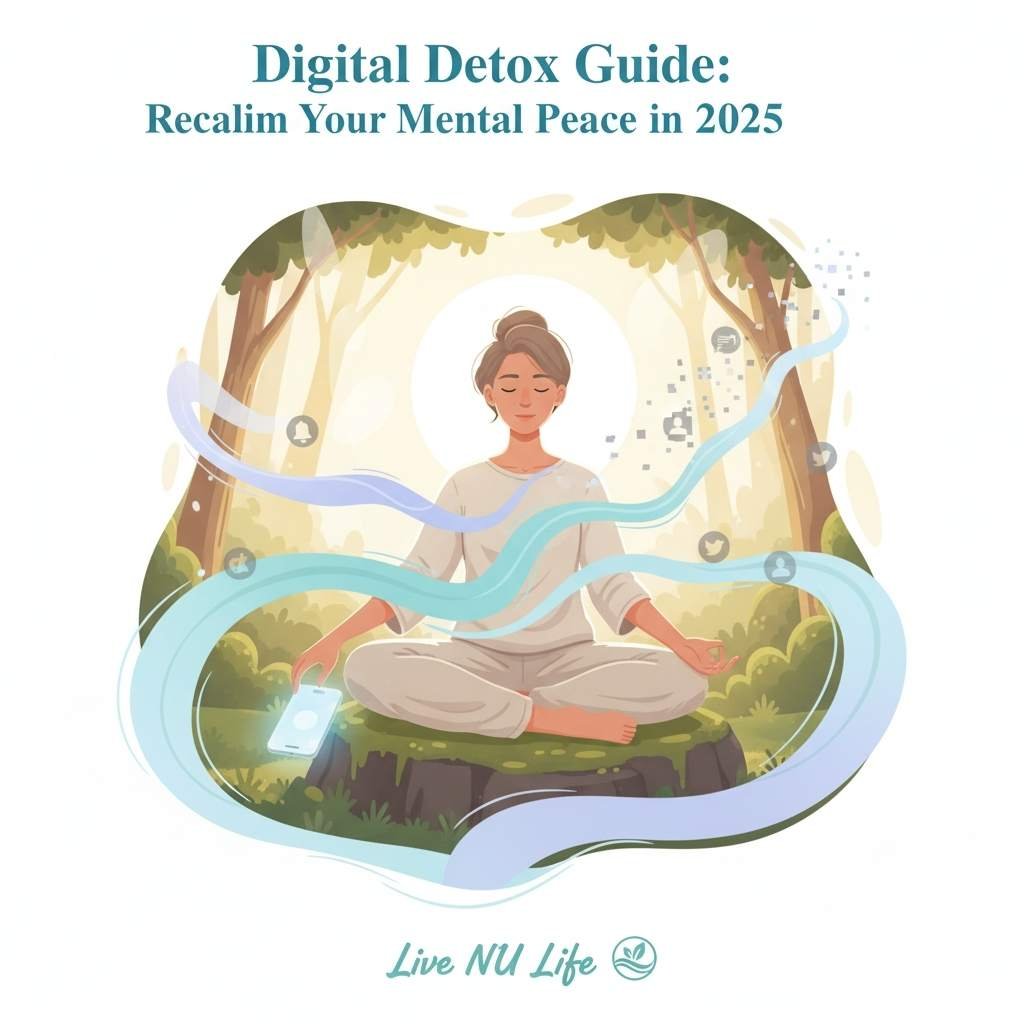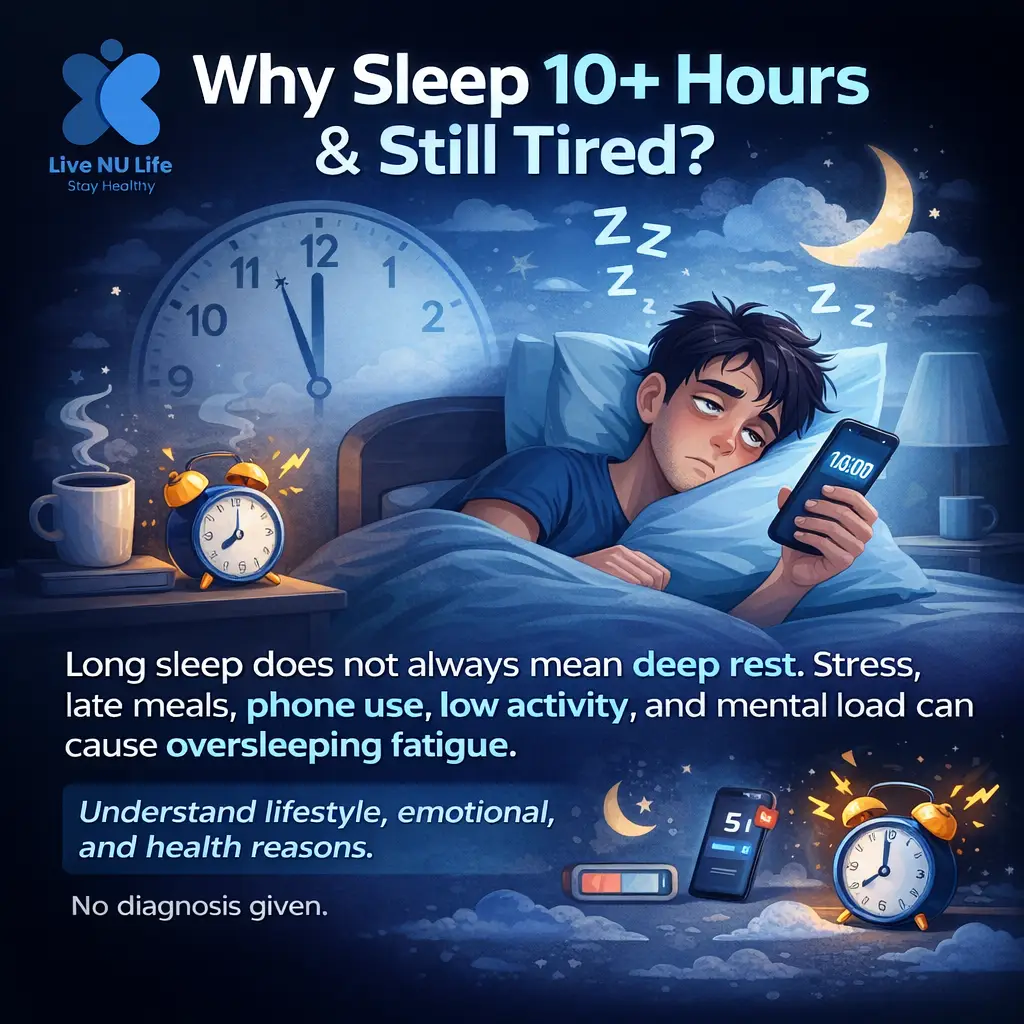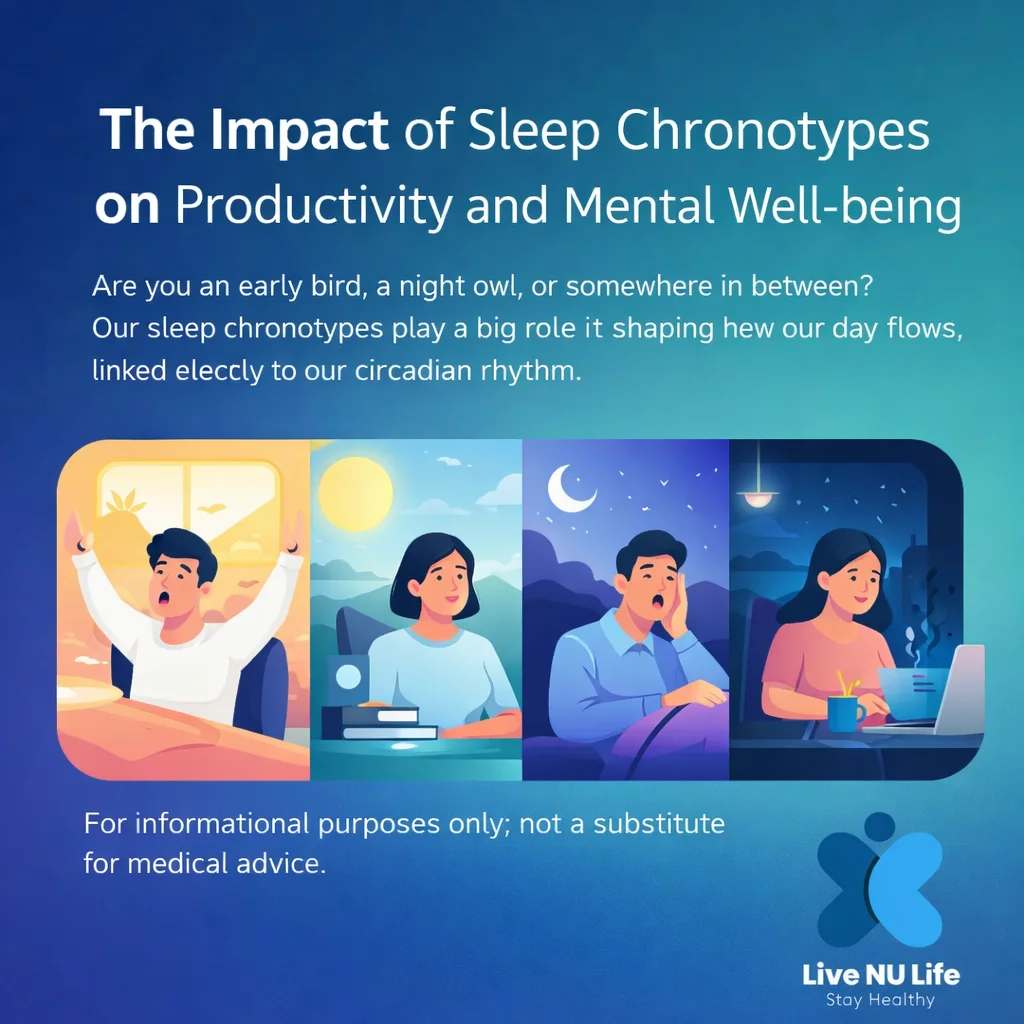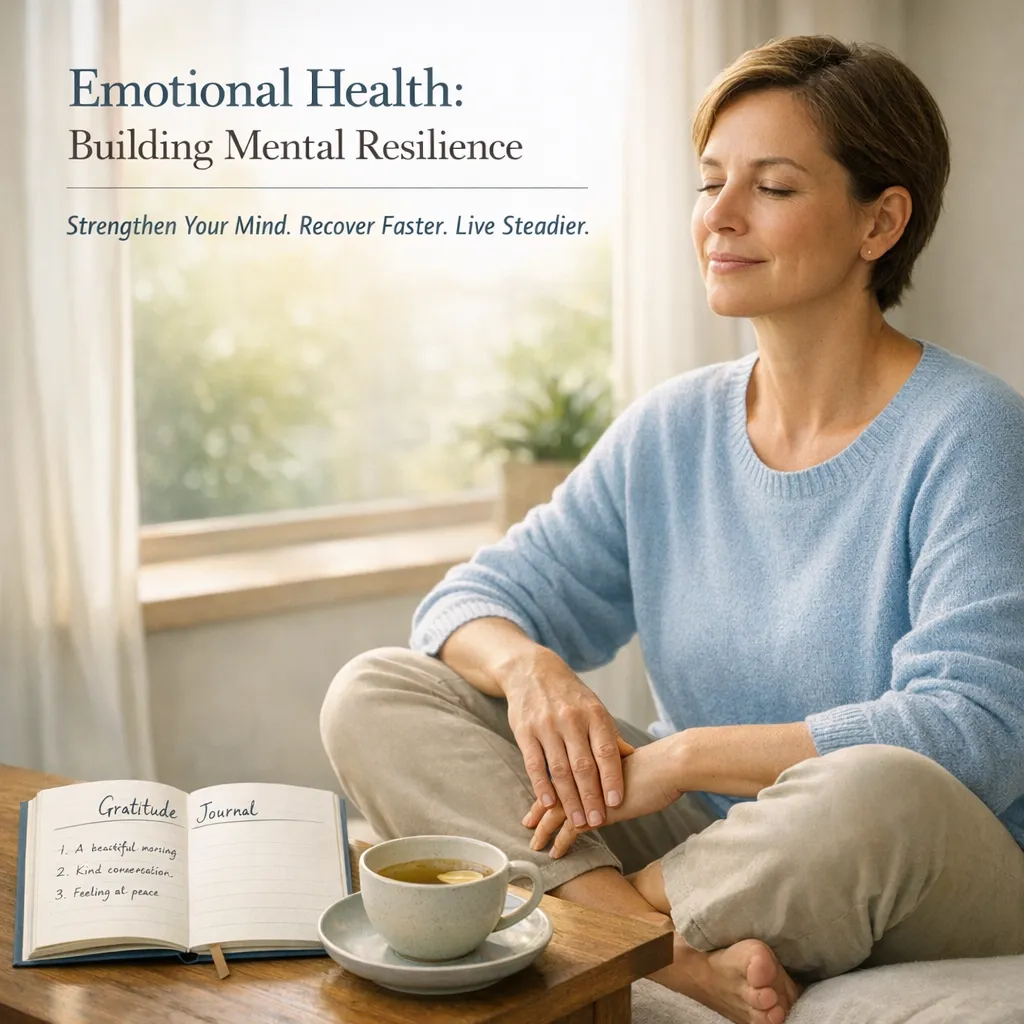Table of Contents
ToggleDigital Detox Guide: Reclaim Your Mental Peace in 2025
Take a pause from screen today. Look up and breathe. The world outside still real. This digital detox guide help you to clean your mind and reclaim balance (yes, even in busy 2025). Start simple. Turn off phone for 30 minutes. Sit quiet. Feel how many time your hand reach for it again (it will surprise you).
Then organize your day around real living, not notifications. Walk early morning without any earphones. Watch sunrise like first time. Eat without scrolling. These small break help your brain to rest and your eyes to heal from screen glare.
If you feel restless without mobile, it’s okay. This is withdrawal, like sugar craving. Stay with it. Slowly you get peace again. Sleep better. Talk face to face. And remember—digital detox not punishment. It’s like cleaning your mental room, so air can flow again.
What Is Digital Detox and Why It Matters in 2025
Digital detox means take break from phone, laptop, and all screens. In 2025, people’s eyes and brain are always stuck on digital world — scrolling, liking, replying. This nonstop noise make you tired inside. You forget to breathe slow. You forget to sleep well. Digital detox help you come back to real moment again.
What Is Digital Detox
- Stop using phone, social media, or emails for some hours or days.
- Use that time for walk, cooking, or talking with someone.
- Try it like small fasting (same idea, just for mind).
Why It Matters in 2025
- Too much blue light harm sleep. (You wake up tired even after 8 hours.)
- Too much scrolling make anxiety rise. You compare life with others too much.
- Digital detox make mind calm, eyes fresh, and focus strong again.
Simple Steps To Start
- Turn off notifications (yes, all of them).
- Keep phone outside bedroom.
- Touch sunlight every morning, not the screen.
- Do one day every week no phone day.
Small breaks like this heal your nervous system. You start to feel peace — slow and quiet again.
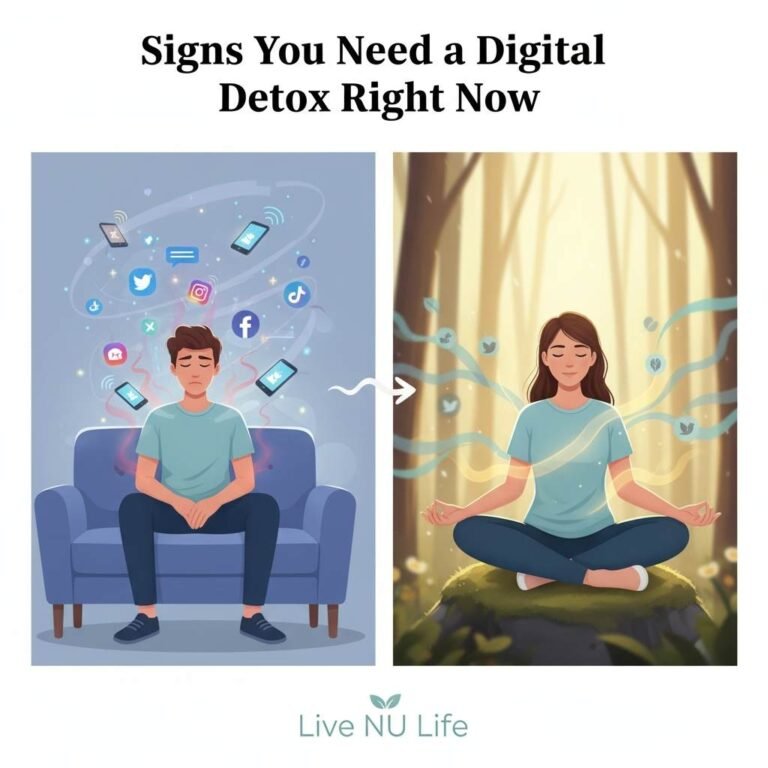
Signs You Need a Digital Detox Right Now
Sometimes your mind feels noisy. Phone always buzzing, hands always scrolling. That’s a clear sign something off. You lose focus, sleep less, feel irritated. This is not just “being busy.” It means your brain need rest. A digital detox helps reset that. So watch these signs carefully and act quick.
- You Wake Up and Check Phone First
Stop that right now. When you open eyes and go straight to screen, your mind never get calm moment. Try instead to breathe few times first (just simple deep breath).
- You Feel Anxious When Battery Low
Notice your emotion. If low battery makes you panic, that’s not normal. Put phone away for 10 minutes daily (start small, like before lunch).
- You Scroll Without Purpose
You open one app and end up hours later watching random things. That’s mind fatigue. Keep timer (15–20 min) to limit mindless scroll.
- You Forget Simple Joys
If food taste dull, or rain sounds weak—your attention already in screen. Go for walk without phone (even 5 min help).
- You Sleep With Screen
Blue light trick your brain. Keep devices outside bedroom. Read book or stretch instead.
Now, give your eyes and brain real rest. Digital detox is not trend—it’s medicine for mind.
How Excess Screen Time Impacts Your Mental and Physical Health
Too much screen time is trouble for your mind and body. You sit long hours, look at phone, computer, TV. Stress comes easy, energy goes down. Eyes feel dry or blurry, mood feels low. Hard to sleep sometimes. This kind of habit (too much screen) change your health slowly. Now, fix this step by step.
Protect Your Eyes
- Blink often (dry eyes are common).
- Look away from screen every 20 minutes (as if searching horizon).
- Adjust brightness (not too dark, not too sharp).
Move Your Body
- Stretch arms and back after 30 minutes screen (feel like a lazy cat).
- Walk few steps around room (good for joints).
- Roll shoulders (loosen muscle knots).
Give Mind a Break
- Stop media scrolling for some time (mind need pause, like water settle).
- Shut eyes, breathe deep for one minute (feel air fill belly).
- Do small hobby (draw, write, cook—relax brain).
Sleep Smarter
- Switch off screen one hour before sleep (blue light confuse brain).
- Read real book (not phone, not tablet).
- Keep room dark and quiet (body settle for sleep).
So, check yourself today (not tomorrow). Less screen, more moving. Mind and body thank you.
Step-by-Step Guide to a Successful Digital Detox
Too much screen make brain tired. Social media drain energy (you know this feeling). Eyes dry, sleep bad, and mind always jump. Time to take back control. Do a simple digital detox. Not hard. Just need small changes, step by step.
- Reducing Social Media Usage
Start small. Delete one app you waste time on (maybe Instagram). Turn off notifications. Don’t scroll before bed. Replace the habit—walk, stretch, or drink tea. Notice how quiet feels after few days (this quiet is good for mind).
- Setting Device-Free Hours
Pick one hour each day. Put phone away. Start with dinner time or bedtime. Use alarm clock instead of phone at night. Tell family this is your no-phone hour (so they don’t disturb). Slowly expand the time.
- Mindful Use of Smartphones and Gadgets
Before unlock your phone, ask: why now? what I need? (most time no reason). Use gadgets only with clear purpose. When done, lock it again. Treat phone like a tool, not a toy.
Digital detox not about quitting world. It’s about finding space again. Little by little, you get peace back. Mind feel light.
Reduce stress naturally with 5 Natural Stress-Busting Techniques That Actually Work.
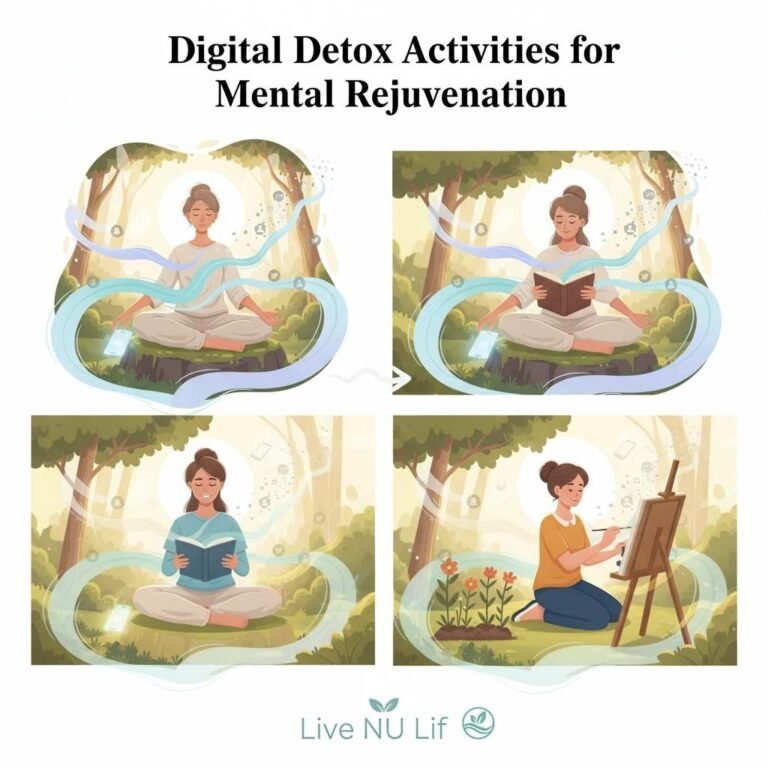
Digital Detox Activities for Mental Rejuvenation
Digital devices eat a lot of our peace. Scrolling all day drains energy and focus. Now it’s time to do a digital detox. Let your mind breathe again. No strict rules, just simple habits to feel alive and calm again (like quiet rain after noise).
Meditation and Mindfulness Practices
- Sit in a quiet corner (not on bed if possible).
- Close eyes and breathe slowly. Count till 4 in and 4 out.
- Imagine collecting stray thoughts like leaves in basket.
- Use guided meditation app only in start (then switch off phone).
- Do this 10 minutes daily, preferably morning before checking phone.
Outdoor Activities and Nature Walks
- Step outside. Walk slowly, don’t rush.
- Watch trees, listen birds. Feel sunlight on face (it really refresh).
- Leave phone at home or in pocket silent mode.
- Try gardening or just sitting in park bench quietly.
Reading and Creative Hobbies
- Pick any real book (not Kindle today).
- Read 10 pages without checking notification.
- Try sketching, write journal, or make clay art.
- These small acts train brain to stay present.
Do these for one week. Feel less anxiety, more clarity, and lighter head. (Mind also need vacation).
How to Maintain Digital Balance After Detox
After digital detox, many people feel calm at first, then slowly fall back into old habits. Mindless scrolling returns, sleep again get short, and focus start to break. This guide show how to keep that digital balance, simply and real, like daily practice.
Start Your Morning Right
- Don’t touch the phone first 30 minutes. Just stretch, drink water, look outside.
- Keep morning light real (sunlight), not from screen.
- Check messages only after breakfast (this reset your mind each day).
Plan Screen Time
- Use timer apps (or simple alarm). Stop when time done.
- Make 2–3 fixed slots for social media instead of random checks.
Bring Back Real Touch
- Read book with hand, write note on paper.
- Meet people face to face. One small talk a day keep balance fresh.
Before Sleep
- Dim screen two hours before bed.
- Try breathing slow (like wave in and out). Shut all gadgets fully.
Learn practical ways to handle daily pressure and maintain inner balance in our Stress Management Solutions guide.
Tools and Apps to Help Manage Screen Time
People spend too many hours looking at phones and laptops now. Eyes get tired, sleep gets messy, and focus go down. That’s why I use few tools and simple apps for screen time control. It’s not about quitting phone. It’s about balance. (And little peace for your mind.)
Use Screen Time Tracker
- Check daily screen hours.
- Notice which app eat most time.
- Many phones already have this (check settings).
Use Focus Mode Apps
- Try “Digital Wellbeing” (Android) or “Focus – block distractions.”
- Lock social apps for few hours.
- Start with 1 hour, then increase slowly.
Night Screen Filter
- Blue light hurt eyes.
- Use “Night Light” or “f.lux” app.
- Turn it on after sunset (helps better sleep).
Take Real Breaks
- Put phone far for 15 minutes every hour.
- Walk, stretch, or look outside window (gives calm).
Common Challenges During Digital Detox and How to Overcome Them
Many people try digital detox but give up soon. The phone keeps calling them. The mind feels hungry for scrolling. This is normal. The brain got trained by constant alert and message tone. So, when you stop, it feels empty. But don’t worry. You can train it again, slowly, like a muscle.
- The Urge to Check Phone
Keep the phone far. (Don’t just silent it, hide it.) Replace checking habit with something simple. Drink water, walk a bit, stretch arms. Each time you win one urge, brain slowly calm down.
- Feeling Bored
This come after few hours. So plan small task. Clean your desk, cook, or take walk. Boredom means mind detoxing (like sweat leaving skin). Let it happen.
- Social Disconnection
Tell people before detox. Say “not online few days.” Invite real talk later. Meet face to face if possible. Real voices heal faster than screen text.
Discover how to boost longevity from within in our Cellular Health Optimization: The Future of Wellness guide.
FAQs – Everything About Digital Detox and Mental Peace
- It means staying away from phone, laptop, TV for some hours or days.
- Do this to reduce mind noise and screen stress.
- You feel more clear in thoughts after few days (like cleaning dust from mirror).
- Start one day per week with no phone.
- Or switch off phone 2 hours before bed.
- Some people go 3 days detox (depends on lifestyle).
- You sleep deeper.
- Eyes stop burning.
- You feel boredom at first, then calmness comes.
- You start to notice small things again (like wind sound or bird voice).
- Keep phone in drawer when eat food.
- Turn off all notifications.
- Read book instead of scrolling.
- Go walk outside (no earphones).
- It slow down mind rush.
- Reduce anxiety and overthinking.
- You feel present again in body and breath.
- Yes, even half day break helpful.
- Start small but be regular.
- Mind learn peace better with small daily rest.
References
Brailovskaia, J., Schillack, H., & Margraf, J. (2020). Tell me why are you using social media! An investigation into the relationship between motives for Instagram use and addictive Instagram use. Journal of Behavioral Addictions, 9(1), 156-166. https://www.ncbi.nlm.nih.gov/pmc/articles/PMC11392003/
Burnell, K., George, M. J., & Underwood, M. K. (2024). Digital detox interventions: A systematic review and meta-analysis. Clinical Child and Family Psychology Review, 27(2), 245-267. https://ijip.in/wp-content/uploads/2025/07/18.01.083.20251303.pdf
Hartanto, A., & Yang, H. (2016). Disparate bilingual experiences modulate task-switching advantages: A diffusion-model analysis of the effects of interactional context on switch costs. Cognition, 150, 10-19. https://www.frontiersin.org/journals/human-dynamics/articles/10.3389/fhumd.2025.1572587/full
Hunt, M. G., Marx, R., Lipson, C., & Young, J. (2018). No more FOMO: Limiting social media decreases loneliness and depression. Journal of Social and Clinical Psychology, 37(10), 751-768. https://www.ncbi.nlm.nih.gov/pmc/articles/PMC11392003/
Jiang, S., & Balaji, M. S. (2021). Digital detox: A systematic literature review and future research agenda. Computers in Human Behavior, 122, 106841. https://ijip.in/wp-content/uploads/2025/07/18.01.083.20251303.pdf
Kaplan, R., & Kaplan, S. (1989). The experience of nature: A psychological perspective. Cambridge University Press.
https://www.frontiersin.org/journals/human-dynamics/articles/10.3389/fhumd.2025.1572587/full
Kolhe, D., & Naik, A. R. (2025). Digital detox as a means to enhance eudaimonic well-being. Frontiers in Human Dynamics, 7, 1572587. https://www.frontiersin.org/journals/human-dynamics/articles/10.3389/fhumd.2025.1572587/full
Medical News Today. (2025, July 14). Digital detox: Benefits, challenges, and how to start. Medical News Today. https://www.medicalnewstoday.com/articles/digital-detox
Montag, C., Wegmann, E., Sariyska, R., Demetrovics, Z., & Brand, M. (2021). How to overcome taxonomical problems in the study of Internet use disorders and what to do with “smartphone addiction”? Journal of Behavioral Addictions, 9(4), 908-914. https://www.frontiersin.org/journals/human-dynamics/articles/10.3389/fhumd.2025.1572587/full
Ramadhan, R. N., Kusmayati, D., & Sari, N. P. (2024). Impacts of digital social media detox for mental health: A systematic review and meta-analysis. PLOS Digital Health, 3(8), e0000532. https://www.ncbi.nlm.nih.gov/pmc/articles/PMC11392003/
Ryff, C. D., & Singer, B. H. (2008). Know thyself and become what you are: A eudaimonic approach to psychological well-being. Journal of Happiness Studies, 9(1), 13-39. https://www.frontiersin.org/journals/human-dynamics/articles/10.3389/fhumd.2025.1572587/full
Setia, S., Merchant, R., & Patel, A. (2025). Digital detox strategies and mental health: A comprehensive scoping review of intervention effectiveness. BMC Digital Health, 3(1), 15. https://www.ncbi.nlm.nih.gov/pmc/articles/PMC11871965/
Ward, A. F., Duke, K., Gneezy, A., & Bos, M. W. (2017). Brain drain: The mere presence of one’s own smartphone reduces available cognitive capacity. Journal of the Association for Consumer Research, 2(2), 140-154. https://www.frontiersin.org/journals/human-dynamics/articles/10.3389/fhumd.2025.1572587/full
Wilmer, H. H., Sherman, L. E., & Chein, J. M. (2017). Smartphones and cognition: A review of research exploring the links between mobile technology habits and cognitive functioning. Frontiers in Psychology, 8, 605. https://www.frontiersin.org/journals/human-dynamics/articles/10.3389/fhumd.2025.1572587/full

